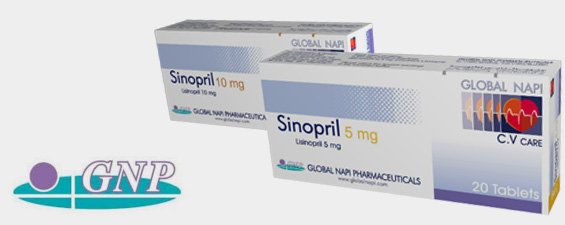- Sinopril 5mg Tablet Contains
Lisinopril 5mg - Sinopril 10mg Tablet Contains
Lisinopril 10mg
How Sinopril Works?
Sinopril is a peptidyl dipeptidase inhibitor. It inhibits the angiotensin converting enzyme (ACE) that catalyzes the conversion of angiotensin 1 to the vasoconstrictor peptide, angiotensin 2. Whilst mechanism through which Sinopril lowers blood pressure is believed to be primarily suppression of the renin-angiotensin-aldosterone system. Sinopril is antihypertensive even in patients with low-renin hypertension.
Sinopril is slowly and incompletely absorbed following oral administration. About 25% of a given dose is absorbed on average, but the absorption varies considerably between individuals, ranging from about 6% to 60%. Peak concentrations in plasma are reported to occur after about 7 hours. Sinopril is reported not to be significantly bound to plasma proteins. It is excreted unchanged in the urine. The effective half-life for accumulation following multiple doses is 12 hours. Sinopril is removed by hemodialysis.
What is Sinopril Used For?
Sinopril is indicated for the treatment of following medical conditions;
- Hypertension
- Heart failure
The treatment of symptomatic heart failure. - Acute myocardial infarction
Short-term (6 weeks) treatment of hemodynamically stable patients within 24 hours of an acute myocardial infarction. - Renal complications of diabetes mellitus
Treatment of renal disease in hypertensive patients with Type 2 diabetes mellitus and incipient nephropathy.
Recommended Dosage of Sinopril Tablets
Sinopril Tablets (Lisinopril) should be administered in a single daily dose approximately the same time each day. The absorption of Sinopril is not affected by food. The dose should be individualized according to patient profile and blood pressure response.
When to avoid Sinopril Tablets?
Sinopril Tablet is contraindicated in patients;
- With hypersensitivity to lisinopril, to any of the excipients or any other angiotensin converting enzyme (ACE) inhibitor.
- With history of angioedema associated with previous ACE inhibitor therapy.
- With hereditary or idiopathic angioedema.
- During pregnancy and lactation.
Side Effects of Sinopril
Sinopril is generally well tolerated. However, following side effects have been observed and reported during treatment with Sinopril and other ACE inhibitors.
- Common Side Effets
Dizziness, headache, orthostatic effects (including hypotension), cough, diarrhea, vomiting. - Uncommon Side Effects
Mood alterations, paresthesia, vertigo, taste disturbances, sleep disturbances, myocardial infarction or cerebrovascular accident, possibly secondary to excessive hypotension in high risk patients, palpitations, tachycardia. Raynaud’s phenomenon, rhinitis, abdominal pain, nausea and indigestion, rash, pruritus, impotence, fatigue, asthenia, increases in blood urea, increases in serum creatinine, increases in liver enzymes, hyperkalemia, hypersensitivity, angioneurotic edema, angioneurotic edema of the face, extremities, lips, tongue, glottis, and/or larynx. - Rare Side Effects
Decreases in hemoglobin, decreases in hematocrit, mental confusion, dry mouth, urticaria, alopecia, psoriasis, uremia, acute renal failure, gynecomastia, increases in serum bilirubin, hyponatremia. - Very rare Side Effects
Bone marrow depression, anemia, thrombocytopenia, leucopenia, neutropenia, agranulocytosis, hemolytic anemia, lymphadenopathy, autoimmune disease, hypoglycemia, bronchospasm, sinusitis, allergic alveolitis/eosinophilic pneumonia, pancreatitis, intestinal angioedema, hepatitis – either hepatocellular or cholestatic, jaundice and hepatic failure, diaphoresis, pemphigus, toxic epidermal necrolysis, Stevens-Johnson Syndrome, erythema multiforme, oliguria/anuria, cutaneous pseudo-lymphoma.

Leave A Comment